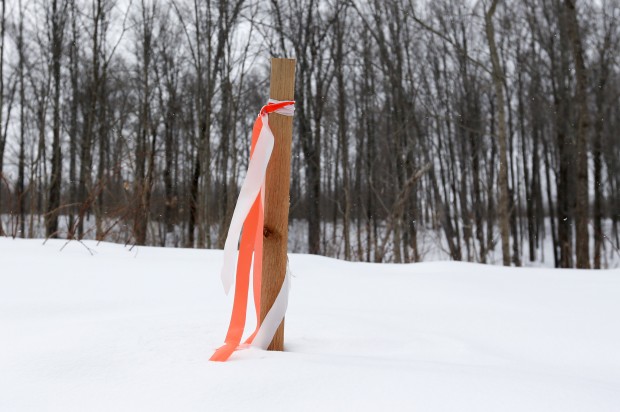Federal judge rejects permits challenge in new setback to Constitution Pipeline
-
Jon Hurdle

Mike Groll / AP Photo
In this file photo, a ribbon tied to a stake on Kernan family property marks the proposed path of the Constitution Pipeline in Harpersfield, N.Y. A federal judge has rejected the latest challenge by the company to build the pipeline.
A federal judge dealt the latest blow to the planned Constitution Pipeline when he rejected the builder’s argument that it would be injured by having to obtain certain state permits to construct the natural gas pipeline from Northeast Pennsylvania to New York State.
Judge Norman Mordue of the Northern District of New York said the Constitution Pipeline Company failed to show injury from the permit requirements on water crossings, excavations and related activities, even though the state has yet to decide whether to issue them.
“Constitution has not plausibly pleaded injury in fact … it has not pleaded either actual injury or a threatened injury,” the judge wrote in a 15-page opinion issued Thursday. “Constitution merely alleges possible future injury.”
He said the New York State Department of Environmental Conservation has not refused to issue the permits. Rather, he said, the state has simply not acted on them, and so the company could not argue that it had been injured by the lack of permits.
“A finding of injury to Constitution arising from NYSDEC’s inaction would be based on a speculative chain of possibilities that may never occur,” the judge wrote.
The company had asked the court to support its contention that it didn’t have to obtain the permits, arguing that as a “public utility” project, it pre-empted local regulations.
The judge granted a motion to dismiss brought by New York State, which in April 2016 denied a water-quality permit to the 125-mile project, halting preparations for construction. The company, a joint venture between the Williams Companies and Cabot Oil & Gas, is separately fighting the state’s action in an appeals court.
The ruling is another setback for the project which drew criticism from pipeline opponents when it began clearing trees on some parcels of private land in Pennsylvania after winning eminent domain battles in the courts.
Affected landowners included the Holleran family of New Milford Township, Susquehanna County, which in March 2016 lost several acres of maple trees to a felling crew guarded by heavily armed federal marshals.
Lynda Farrell, executive director of the Pennsylvania-based Pipeline Safety Coalition, said the pipeline may yet be saved if Williams wins its appeal over water permits, but the latest ruling doesn’t bode well for the project.
“I can’t say Constitution is dead, but they sure are floundering,” she said.
By arguing that it shouldn’t have to obtain the permits, Williams is trying to get out of its obligations, using “alternative logic that can be used to bypass what was established as a sound regulatory reason for halting the project,” Farrell said.
Christopher Stockton, a spokesman for Williams, said the company is disappointed by the ruling but it does not affect its water-permit appeal, on which it expects a decision as early as the second quarter of this year.
The company expects the pipeline to begin operations as early as the second quarter of 2018, assuming that legal challenges are “promptly and satisfactorily concluded,” Stockton said. “We remain firmly committed to obtaining the necessary permits and moving forward with this critical energy infrastructure project,” he said.
Jeff Tittel, director of the New Jersey Sierra Club, welcomed the ruling, which he said builds on New York State’s decision in 2014 to ban fracking for natural gas.
“We applaud the federal court for upholding the Clean Water Act and Gov. Cuomo’s denial of the Constitution Pipeline,” Tittel said in a statement. “In a big victory for the environment, this decision has sided with clean water, the environment, and against dirty fracking pipelines.”
















